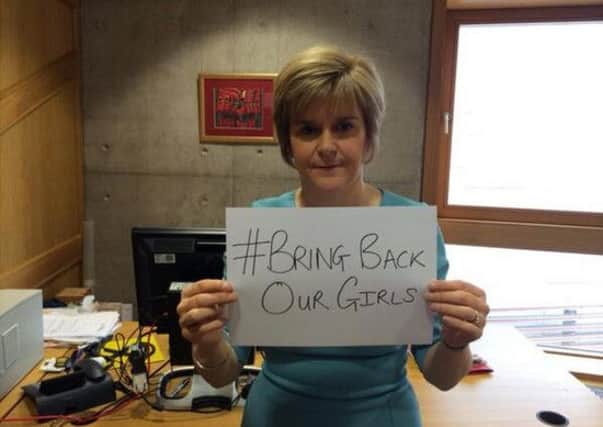Nigeria: ‘Girls kidnapping will be end of terror’


He spoke as the hostage crisis overshadowed his opening address to a major conference designed to showcase investment opportunities in Africa’s biggest economy.
Speaking at the World Economic Forum being hosted in the capital Abuja, Mr Jonathan thanked foreign nations including the United States, Britain, France and China for their support in trying to rescue the girls.
Advertisement
Hide AdAdvertisement
Hide AdThey were kidnapped from a secondary school in Chibok on 14 April by the radical Islamist sect Boko Haram, which opposes Western-style education for women.
He thanked delegates for coming despite the danger posed by the militants, then quickly moved on to a speech about creating jobs.
“As a nation we are facing attack from terrorism,” Mr Jonathan told delegates. “I believe that the kidnap of these girls will be the beginning of the end of terrorism in Nigeria.”
Despite such pledges, Mr Jonathan admitted on national television this week that he had no idea where the girls were.
The kidnappings and numerous other attacks by Boko Haram have overshadowed Nigeria’s hosting of the forum, an annual gathering of the rich and powerful that replicates the one in Davos, Switzerland.
Parents of the kidnapped girls said troops had arrived in Chibok on a mission to find them. “There are about three military helicopters hovering around our town and many soldiers have just arrived,” said a woman, whose 16-year-old daughter was taken. “They are moving and advancing toward the bush. We hope and pray they succeed in rescuing our daughters.”
France became the latest nation to offer help on Wednesday, saying it was boosting intelligence ties with Nigeria and sending security service agents there to tackle Boko Haram.
In the latest Islamist attack in Nigeria, 125 people were killed on Monday when gunmen rampaged through a town near the Cameroon border. Senator Ahmed Zannah put the number killed at 300, although the official toll remained at 100-150.
Advertisement
Hide AdAdvertisement
Hide AdOn Tuesday, residents of a village in the remote north-eastern area where the schoolgirls were kidnapped said another eight girls were seized by suspected members of Boko Haram.
Boko Haram leader Abubakar Shekau has threatened to sell the girls “on the market”, prompting a warning from the United Nations that this would make the perpetrators liable for war crimes.
Boko Haram has emerged in a region that is one of the world’s poorest, with high infant mortality, low literacy and massive youth unemployment that creates easy recruits for radical Islam.
Its five-year-old insurgency is aimed at reviving a medieval Islamic caliphate in modern Nigeria, whose 170 million people are split roughly evenly between Christians and Muslims.
Scholars and human rights officials of the world’s largest Muslim organisation denounced the kidnapping as “a gross misinterpretation of Islam” and demanded the schoolgirls’ release.
“This crime and other crimes carried out by such extremist organisations stand in contradiction to the clear teachings of the blessed Koran,” the Organisation of Islamic Cooperation’s Fiqh Academy said.
Last month’s kidnapping occurred on the day a bomb blast, also claimed by Boko Haram, killed 75 people on the outskirts of Abuja. Another bomb nearby killed 19 people last week, prompting a few delegates to cancel their trips to the WEF.
The inability of security forces to protect the girls, or find them in more than three weeks, has sparked international outrage and led to protests in Nigeria.
SEE ALSO